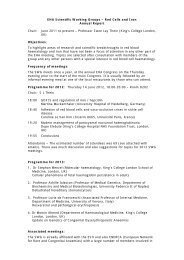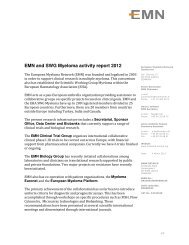H e m a t o lo g y E d u c a t io n - European Hematology Association
H e m a t o lo g y E d u c a t io n - European Hematology Association
H e m a t o lo g y E d u c a t io n - European Hematology Association
You also want an ePaper? Increase the reach of your titles
YUMPU automatically turns print PDFs into web optimized ePapers that Google loves.
J.M. Rowe 1,2<br />
C. Ganzel 1<br />
1 Shaare Zedek Medical Center,<br />
Jerusalem, Israel; 2 Techn<strong>io</strong>n, Israel<br />
Institute of Techno<strong>lo</strong>gy, Haifa, Israel<br />
Hemato<strong>lo</strong>gy Educat<strong>io</strong>n:<br />
the educat<strong>io</strong>n program for the<br />
annual congress of the <strong>European</strong><br />
Hemato<strong>lo</strong>gy Associat<strong>io</strong>n<br />
2011;5:9-19<br />
Acute lymphoblastic leukemia<br />
Management of acute lymphoblastic leukemia<br />
in adults<br />
The treatment of adults with acute lymphoblastic<br />
leukemia (ALL) remains<br />
challenging. While there has been a<br />
gradual improvement in the overall results<br />
over the past 40 years, the <strong>lo</strong>ng term survival<br />
from diagnosis for adults less than 60 years is<br />
still no more than 35–40%. The therapeutic<br />
opt<strong>io</strong>ns have increased over the past decade<br />
to include a better understanding of the indicat<strong>io</strong>ns<br />
for transplantat<strong>io</strong>n and a broadening<br />
of the number of patients who are eligible<br />
for such a procedure. New drugs, as well as<br />
potential targeted monoc<strong>lo</strong>nal antibodies,<br />
have opened up novel areas for study in the<br />
management of ALL. Sensitive techniques<br />
for the detect<strong>io</strong>n of minimal residual disease<br />
have also opened new strategies for post<br />
remiss<strong>io</strong>n management. This paper will<br />
focus on the management of young adults,<br />
up to age 60 years, and will include both<br />
patients who are Philadelphia chromosome<br />
negative ALL, as well as those who are positive.<br />
Most of the discuss<strong>io</strong>n will focus on<br />
newly diagnosed patients.<br />
Prognostic factors<br />
At presentat<strong>io</strong>n<br />
It has <strong>lo</strong>ng been realized that the management<br />
of patients with ALL is dependent on<br />
the prognostic factors at diagnosis. Patients<br />
with known very high risk features are often<br />
assigned different post remiss<strong>io</strong>n strategies,<br />
even if the induct<strong>io</strong>n therapy is not always<br />
altered. Decis<strong>io</strong>ns regarding the appropriateness<br />
of bone marrow transplantat<strong>io</strong>n are also<br />
dependent on the prognostic factors at diagnosis.<br />
Over the past four decades, there has<br />
been a shift in the understanding of the prognostic<br />
factors such that morpho<strong>lo</strong>gy 1 and<br />
cytochemistry, 2 so dominant in the 1970s,<br />
have no prognostic significance nowadays.<br />
Even immunophenotyping, which was the<br />
dominant determining factor for several<br />
decades since the 1980s, is rapidly becoming<br />
less important for prognosticat<strong>io</strong>n, even if its<br />
use remains crucial for the initial diagnosis,<br />
for the detect<strong>io</strong>n of minimal residual disease,<br />
and for the applicat<strong>io</strong>n of specific and targeted<br />
therapies. Thus, although B- and T-lineage<br />
patients are often treated differently,<br />
the level of maturity within B-lineage is no<br />
<strong>lo</strong>nger important for prognosis, 3,4 although<br />
among T-lineage patients, there appears to<br />
be a difference depending on the level of<br />
maturity. 5 At the same time, certain<br />
immuno<strong>lo</strong>gic markers have been recognized<br />
as having significant prognostic impact, the<br />
most important of these being CD20, which,<br />
in several trials, has been reported among<br />
adults with B-lineage ALL to have a <strong>lo</strong>w<br />
complete remiss<strong>io</strong>n rate and infer<strong>io</strong>r overall<br />
survival. 6,7 While these historic prognostic<br />
factors clearly have relevance, they have<br />
now been mostly superseded by genetic<br />
and/or molecular markers leading to a<br />
changing paradigm, incorporating cytogenetics<br />
and molecular determinants 8 (Figure<br />
1). The importance of immu no phenotyping<br />
for assigning specific targeted therapies<br />
against antigenic determinants for B or T-cell<br />
ALL, such as nelarabine, foro desine, or monoc<strong>lo</strong>nal<br />
antibodies, 9–11 will be fully discussed<br />
in the Therapy sect<strong>io</strong>n.<br />
Age has withstood the test of time and<br />
remains the most important prognostic factor<br />
in ALL that is unlikely to be superseded<br />
by any of the new molecular determinants.<br />
Not only are there enormous differences in<br />
prognosis between childhood and adult ALL,<br />
but age also critically affects the prognosis<br />
within adult groups. Although most clinical<br />
studies have used an arbitrary cutoff of 35 or<br />
40 years, 12–14 the prognostic significance of<br />
age, in fact, is a continuum between ages 20<br />
and 60. 14<br />
The prognostic classificat<strong>io</strong>n in ALL, much<br />
like AML, is now moving rapidly towards<br />
cytogenetics and molecular markers. The<br />
Philadelphia chromosome, t(9;22) (q34;q11),<br />
remains the most frequent and clinically significant<br />
abnormality in adult ALL, with an<br />
incidence that increases with age, reaching<br />
50% among older adults with B-lineage. 15<br />
The importance of determining the presence<br />
of the Philadelphia chromosome at diagnosis,<br />
either by cytogenetics or by molecular<br />
detect<strong>io</strong>n of BCR-ABL, cannot be overstated,<br />
as the entire approach to such a patient is<br />
different (see Philadelphia chromosome-positive<br />
ALL sect<strong>io</strong>n). Among patients who are<br />
Philadelphia chromosome-negative, management<br />
is also affected by cytogenetics<br />
(Table 1) and this categorizat<strong>io</strong>n has a major<br />
impact on choosing the appropriate therapy<br />
for ALL. 16 In the past, due to the relative rarity<br />
of ALL in adults, the precise prognostic<br />
significance of many of the recurring cytogenetic<br />
abnormalities could not be determined<br />
due to the relatively small numbers. The<br />
analysis of cytogenetics among patients<br />
Hemato<strong>lo</strong>gy Educat<strong>io</strong>n: the educat<strong>io</strong>n programme for the annual congress of the <strong>European</strong> Hemato<strong>lo</strong>gy Associat<strong>io</strong>n | 2011; 5(1) | 9 |












